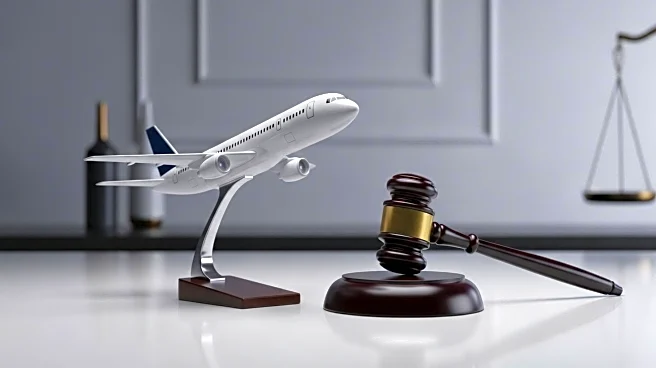What's Happening?
Families of victims from two Boeing 737 Max crashes are preparing to make a final plea for criminal prosecution against Boeing. A federal judge in Texas will hear arguments regarding a U.S. government motion to dismiss a felony charge against Boeing. The company was charged with conspiracy to commit fraud related to the crashes that killed 346 people in Indonesia and Ethiopia. Boeing had initially agreed to a plea deal, but the judge rejected it, citing concerns over diversity policies influencing the selection of an independent monitor. The Justice Department has since renegotiated the plea deal, offering Boeing a non-prosecution agreement in exchange for $1.1 billion in fines and compensation, along with internal safety reforms.
Why It's Important?
The outcome of this case holds significant implications for corporate accountability and aviation safety standards. If Boeing is prosecuted, it could set a precedent for holding corporations accountable for safety failures. The case also highlights the tension between legal accountability and corporate influence, as Boeing's financial settlements and reforms are weighed against the demand for criminal prosecution. The decision could impact Boeing's reputation and financial standing, influencing investor confidence and regulatory scrutiny. Families of the victims argue that the lack of prosecution is a denial of justice, emphasizing the need for transparency and accountability in corporate practices.
What's Next?
The judge's decision on whether to dismiss the charge will be crucial. If the motion is denied, it could lead to a public trial and potential prosecution of former Boeing executives. The Justice Department has reserved the right to refile charges if Boeing fails to comply with the non-prosecution agreement. The families of victims are advocating for a special prosecutor to take over the case, seeking more severe financial penalties and public accountability. The aviation industry and legal experts are closely monitoring the case, as its resolution could influence future regulatory and legal approaches to corporate misconduct.
Beyond the Headlines
The case raises ethical questions about corporate responsibility and the influence of financial settlements in legal proceedings. It also underscores the importance of transparency in regulatory processes, as Boeing's alleged deception of government regulators contributed to the crashes. The broader implications for aviation safety and corporate governance are significant, as stakeholders consider the balance between financial penalties and criminal accountability. The case may prompt discussions on the role of diversity and inclusion policies in corporate oversight and legal agreements.








